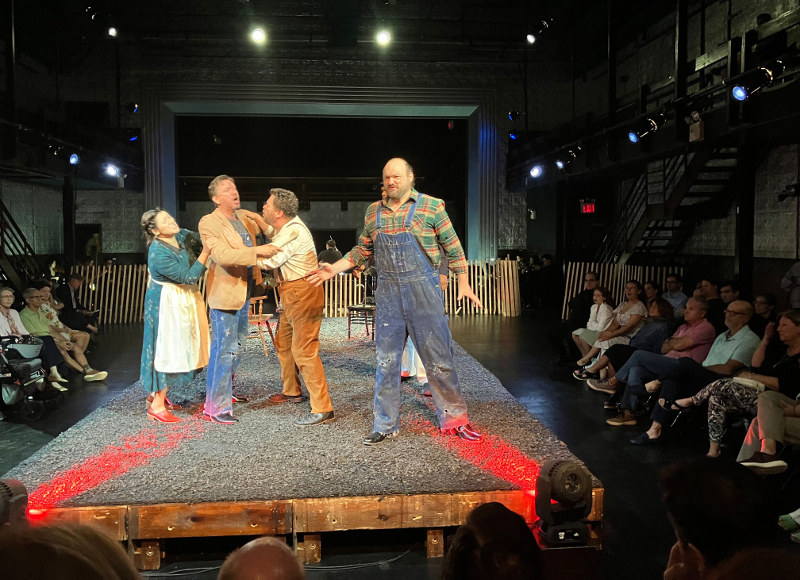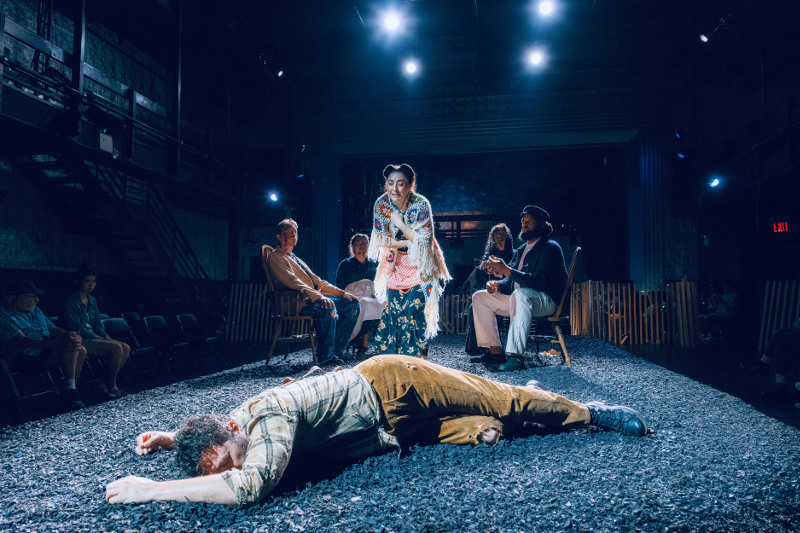
BEYOND THE HORIZON
Opera in Three Acts
Music by Nicolas Flagello
Libretto by Nicolas Flagello and Walter Simmons
Orchestration by Anthony Sbordoni
Presented by Teatro Grattacielo at LA MAMA Shares, 66 East 4th Street, New York NY
Sunday, September 15, 2024
Eugene O’Neill is the most operatic of American playwrights — think of those conflict-ridden families, those soaring and searching soliloquies — so it’s surprising that of his thirty full-length plays and twenty-one one-acts, less than a handful have been adapted for the opera stage. The latest of these, making its world premiere last weekend at La MaMa on New York’s Lower East Side, is Beyond the Horizon.
O’Neill’s first full-length work to be staged (in 1920) and his first Pulitzer Prize winner, the play is the story of two brothers, Andrew, a practical farmer, and Rob, a tubercular, poetry-loving dreamer, who swap destinies just as Rob is about to go away to sea. On the point of leaving, Rob confesses his hidden love for Andrew’s sweetheart, Ruth, she reveals that she loves him and not his brother, and Andrew ships out in his stead, leaving Rob and Ruth to marry and tend the farm. Everything goes wrong, of course (this is O’Neill we’re talking about): Rob mismanages the farm to the point of ruin, his tuberculosis returns, and his and Ruth’s child dies; Andy leaves the sea and goes into business, where his initial success is wiped out by speculative losses; and Ruth, embittered, tells Rob she doesn’t love him, but has always been in love with Andy. When she says this to Andy, however, he’s repelled: he doesn’t love her, at least not any more; he loves Rob, his brother — but Rob dies as the curtain falls. No happy ending here.
Beyond the Horizon didn’t have an easy journey to the operatic stage. The musicologist Walter Simmons suggested the scenario to the composer Nicolas Flagello, whose emotion-driven and melodic music, so unlike that of the academic formalists of the mid-twentieth century, seemed to Simmons a perfect fit for O’Neill. But by the time the two men finished a piano score in 1983, Flagello was already suffering from a degenerative illness that would cause his death in 1994. A complete orchestration would have to wait until Anthony Sbordini provided one. And it wasn’t until Sunday that Teatro Grattaciello, a company devoted to revitalizing and producing operas in the Italian tradition for often non-traditional audiences, unveiled it in a single world-premiere performance, energetically conducted by Christian Capocaccia, who brought out the rich orchestral textures beneath the singers’ lines.

Swiftly-paced at 75 minutes with no intermission, the libretto shears away O’Neill’s often baggy speeches, tightens the plot, sharpens conflict (there’s a doozy of a family quarrel at the end of Act One), and centers the drama on the ill-fated central triangle. In La MaMa’s big black-box theatre, their interaction played out on a cleverly designed set by Taylor Friel consisting of a raised platform covered in gravel that evokes the stony fields New England farmers must struggle with. The orchestra was placed behind this performing space, under the proscenium, which helped centralize and amplify the sound but must have been challenging for Maestro Capocaccia, who nonetheless managed to keep players and singers together (perhaps he has eyes in the back of his head).
All three leads were strong, with the baritone John Robert Green, conveying Andy’s strength, the tenor John Bellemer bringing poetic yearning to Rob, and Sara Kennedy, a soprano with powerful high notes but an equally plangent chest voice, earning bravos for her final arioso, “I now know what I did not know before,” in which Ruth faced up to the “bitter truth” of the wasteland she’s made of three lives by her misguided choices. And they managed to wring plenty of drama out of a vocal score that emphasized recitative instead of more emotive melody. If the complexity of O’Neill’s vision of cosmic disillusionment seemed tidied up into a story of a love-triangle gone wrong, this decision made the work more personal, more pointed and more performable; with luck, it will have a life beyond the horizon of a Sunday afternoon at La MaMa.
Amanda Vaill has written about the arts and culture for Town & Country, Harper’s Bazaar, GQ, New York, and other publications. She is the author of Somewhere: The Life of Jerome Robbins and the forthcoming Pride and Pleasure: The Schuyler Sisters in an Age of Revolution (FSG, Fall 2025), among other books.
